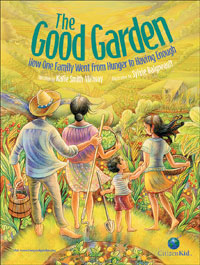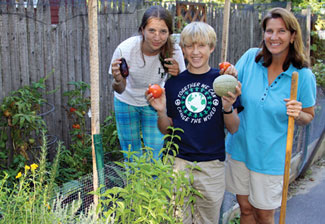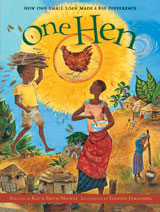Empowering Social Entrepreneurs
Lisa Leslie Henderson writer
After a long winter, local author Katie Smith Milway and her family are ready to get their fingers in the dirt, and prepare their vegetable patch for another growing season. Ever since she began working on her children’s book, The Good Garden: How One Family Went from Hunger to Having Enough, which tells the story of a young Honduran woman who transforms her family’s small farm and eventually her community through simple sustainable farming methods, the Milways have been planting, watering, weeding, and experiencing firsthand the joys of backyard farming. They’ve managed to grow peppers, tomatoes, Brussels sprouts, and herbs, but varmints keep gobbling up their corn.
since she began working on her children’s book, The Good Garden: How One Family Went from Hunger to Having Enough, which tells the story of a young Honduran woman who transforms her family’s small farm and eventually her community through simple sustainable farming methods, the Milways have been planting, watering, weeding, and experiencing firsthand the joys of backyard farming. They’ve managed to grow peppers, tomatoes, Brussels sprouts, and herbs, but varmints keep gobbling up their corn.
“We have a new appreciation for how delicious home-grown food can be, but also for how challenging it can be to harvest enough food, consistently, to sustain a family,” Milway explains. “We would starve without our local stores!”
The Good Garden’s main character is named Maria Luz, and she is based on real life Honduran Maria Cecilia “Ceci” Vasquez. For many years Ceci’s family, too, struggled to grow food against the forces of nature, but they did not have the luxury of being able to buy their way out of food deficit at their local market. Like many subsistence farmers around the world, if their harvest was thwarted by weather or pestilence, and it often was, they would go hungry. Sometimes, the men would have to leave for months at a time to find work on coffee plantations.
A rural teacher, Don Elías Sanchez, portrayed as schoolmaster Don Pedro in the book, trained the farming families of Ceci’s village in sustainable agriculture techniques and changed their lives. Through applying the “maestro’s” suggestions to their farms, The Good Garden’s students, and Ceci’s real family, were able to vastly improve their yields. What’s more, they became entrepreneurs, gaining the confidence to take their own produce to market, and sidestep the middlemen, or “coyotes,” that preyed on illiterate farmers.
The Vasquezes’ entrepreneurial vision, which included building the first tomato greenhouses in their region, led to vegetable exports around the country. The increased revenue allowed Ceci’s family to live off their land and her parents to invest in rebuilding their home, in proper sanitation, and in sending Ceci to secondary school. It also allowed them to take one day a week to train neighboring farmers, putting into practice Sanchez’s credo—“Ideas unshared have no value!”
 “I wanted to share Ceci’s story with kids around the world to empower them to tackle any problem to improve their lives and the lives of others,” Milway explains. “I especially hope that The Good Garden piques their interest in food production and combating world hunger.”
“I wanted to share Ceci’s story with kids around the world to empower them to tackle any problem to improve their lives and the lives of others,” Milway explains. “I especially hope that The Good Garden piques their interest in food production and combating world hunger.”
Already The Good Garden (www.thegoodgarden.org) and another of Milway’s children’s books, One Hen: How One Small Loan Made a Big Difference, which tells the tale of an enterprising Ghanaian boy named Kojo, have inspired many children and adults. Why are Milway’s books so popular? New York Times Magazine essayist William Deresiewicz provides a clue. He has dubbed the millennials “Generation Sell,” for the way they hang a shingle over every pursuit from walking pets to coding online games and for having heroes like entrepreneur Steve Jobs. Says Milway, “The Good Garden and One Hen key into this sensibility, but with the notion that sharing success—passing it forward as do heroes like Maria Luz and Kojo—increases its value.”
Last fall, the Wellesley Free Library featured The Good Garden in its first-ever town-wide reading program, and the Wellesley Free Library Foundation flew Ceci to Wellesley to discuss sustainable gardening and food security with students in elementary, middle, and high school. In addition, Ceci helped to launch a new learning game from Hasbro, Inc. and education nonprofit One Hen, Inc. called Chutes and Ladders®: The Good Garden edition, where the ladder cards tell players they have adopted techniques such as terracing and composting, while the chutes relate to drought, pestilence, or unfair credit. One Hen and Points of Light Institute’s GenerationOn unit will give away 4,000 copies of the game free to families and educators who register at www.oneheninc.org in the run up to Earth Day on April 22nd.
What began as colorful and motivational storytelling has since morphed into a broader movement. In response to educators’ interest in using her books and their companion Web  sites to teach students about world issues, Milway co-founded One Hen, Inc. with Babson MBA graduate Amma Sefa-Dedeh of Ghana (www.oneheninc.org). The education non-profit equips educators with stories, interactive resources, and hands-on activities to teach financial responsibility, personal initiative, global awareness, and giving back.
sites to teach students about world issues, Milway co-founded One Hen, Inc. with Babson MBA graduate Amma Sefa-Dedeh of Ghana (www.oneheninc.org). The education non-profit equips educators with stories, interactive resources, and hands-on activities to teach financial responsibility, personal initiative, global awareness, and giving back.
To date, educators from more than 140 countries and all 50 states have used resources on www.onehen.org, while the full-blown One Hen Academy curricula is in use in charter schools, school districts, and summer schools across seven U.S. inner cities and a number of suburbs. Wellesley Middle School teacher Jonathan Rabinowitz, who is co-teaching One Hen Academy in sixth grade with fellow teacher Susan Hirsh, says, “We are doing this to help teach kids multiple life-long skills including the power of effective teamwork, financial literacy, and the importance of giving back to your local and worldwide community.”
Several other organizations have joined what Milway calls the One Hen “flock,” to further its mission. “The initiative moved pretty quickly from me to we,” Milway says enthusiastically. Partners in the cause include global web development firm SapientNitro, which built One Hen’s online game site pro bono (www.onehen.org). African beads are the currency of the site and it offers students a chance to transform their bead winnings from online games into real loans to micro-entrepreneurs, backed by One Hen’s field partner, microfinance agency Opportunity International.
Where does Milway see this movement heading? “Technology will be the lever by which we increase our impact,” Milway explains. By adopting interactive online training, One Hen  plans to coach teachers in practical, hands-on ways to foster entrepreneurship. Supporting an online community where teachers can exchange ideas, approaches, and results one-to-one, and in real time, is Milway’s ultimate goal.
plans to coach teachers in practical, hands-on ways to foster entrepreneurship. Supporting an online community where teachers can exchange ideas, approaches, and results one-to-one, and in real time, is Milway’s ultimate goal.
The roots of this growing, global network, Milway is quick to point out, are here in Wellesley and Weston and they are deepening as the movement grows. Expect a robust harvest from this seed of an idea. And imagine the impact when One Hen can virtually link classroom to classroom from town to town. Odds are good it will happen: Sefa-Dedeh was named a Babson Alumni “Rising Star Entrepreneur” last fall. And Milway and Sefa-Dedeh recently shared the One Hen story at TEDx New England (http://www.tedxnewengland.com). Clearly, they are cross-pollinating their ideas and tilling rich soil, as the One Hen support network continues to bloom, including here in Wellesley and Weston, where it all began.


recent comments